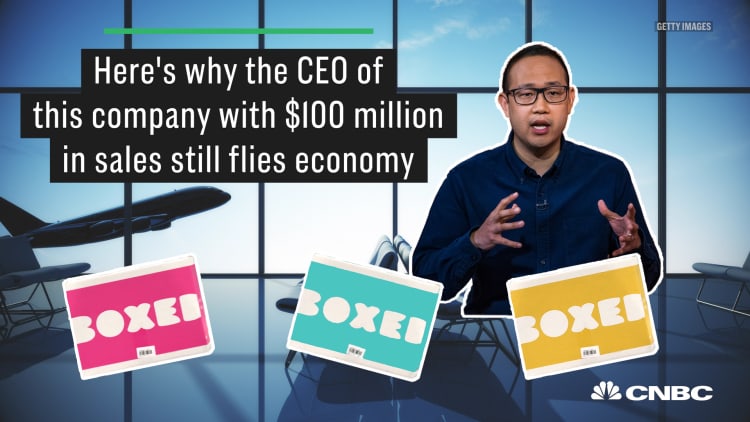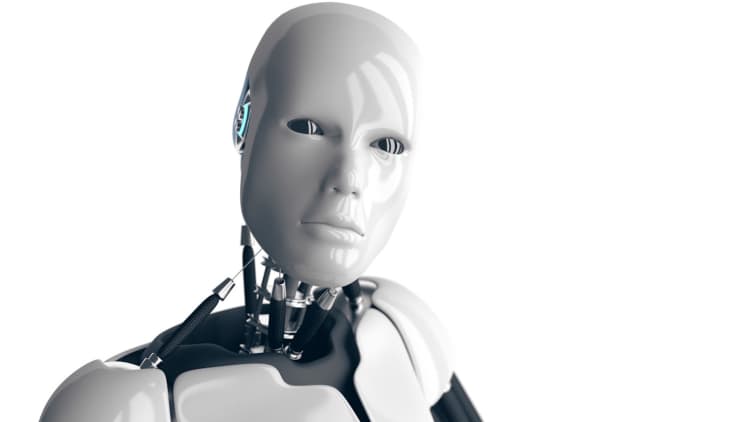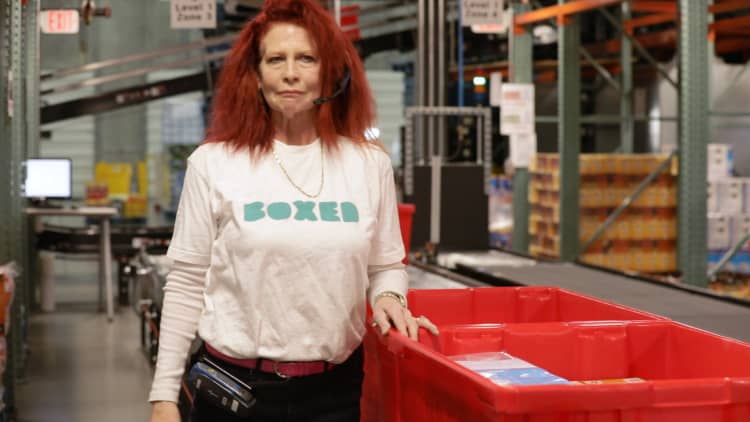Barbara Ward started working with online warehouse retailer Boxed in March of 2015. She's trained as both a picker, which means she takes items from the shelves and collects them to be shipped, and a packer, which means she takes items that have been collected and puts them in boxes to be shipped.
"I started in Edison, [New Jersey,] where things are, for lack of a better word, manual. You had a cart and you would actually go up and down aisles to the product and put it on a cart and go to a packing table," Ward tells CNBC Make It.
Now, Ward works at Boxed's highly automated warehouse in Union, New Jersey. There, employees are assigned a zone in which to work and the bins (known as totes), each filled with the contents of an order, arrive to them via conveyor belt.
"The tote comes to you and you put the product in the tote and the tote goes away and another tote shows up. It's much easier, more interesting, it's kind of fun because you get to wear a headset, and the day goes by very quickly," says Ward.
"If you were to tell me, 'OK, you're going to be on your feet for 10 hours,' I'd be like, 'I can't do that.' But, yeah, I can, and the day goes by very quickly," says Ward.
Founder Chieh Huang started Boxed in his parents' garage in suburban New Jersey in 2013. That year, the company did $40,000 in sales. By 2016, Boxed sold more than $100 million worth of bulk toilet paper, snacks, toiletry items and the like. (The company has not yet released its 2017 revenue.) In January, Boxed reportedly turned down a buyout offer from Kroger in the neighborhood of $325 million to $500 million. The company is reportedly now being courted by Amazon and Walmart, though representatives did not respond to CNBC Make It's request for comment.
It was in April 2017 that Boxed fulfilled its first order at its automated factory in Union, says Rick Zumpano, a vice president of distribution at Boxed Wholesale.
That warehouse is a 140,000-square-foot facility that ships 30,000 units via 3,000 orders per day, Zumpano tells CNBC Make It. It takes 75 people working on the factory floor on a given day to operate the sorting and packing machines, which operate just under 2.5 miles of conveyor belts, Zumpano says. There are also people in 10 to 12 leadership roles and 20 to 30 people working the front office.
The factory cost "millions of millions of dollars" to build, says Huang, and it could take from two to five years to see it pay off.
"We have a pretty rigorous way to measure if we're getting our return on investment and right now, we're on track to seeing that," he says.
Veronica Mena, who started working at Boxed in September 2016, says that when management announced the transition from the manual protocol to the more automated facility, much of the warehouse staff was anxious.
"Some of the rumors were like, 'Oh, they are not going to need this many people, because [we'll] have robots doing things for us! They are not going to need a lot of people walking around, everything is stationary.' You know, stuff like that," Mena tells CNBC Make It.
Indeed, some reports about automation replacing people are concerning. By 2030, 75 million workers around the globe will need to change occupational category due to automation, according to a December 2017 study from the the business and economics research arm of the consulting firm McKinsey, the McKinsey Global Institute. Further, by 2030, 400 million jobs could be potentially displaced by adoption of automation, according to the report. These estimates are based on analysis of 46 countries that include 90 percent of global gross domestic product and a mid level pace of adoption of automation. Those estimates increase to 375 million and 800 million respectively if automation is adopted at the fastest pace McKinsey calculated.
However, specifically to avoid displacing its staff, Boxed committed to retrain its workforce.
"We've been true to our original mission of not laying anyone off because of the automation," Huang tells CNBC Make It. "And luckily, we've been able to do that. It's taken a lot of grit and a lot of hard decisions for us to get to that conclusion, but luckily, we've been able to grow as a company, and the volume is what drives the decision rather than a bottom-line dollar cost savings."
Working through the transition and bringing the staff along the journey, wasn't easy. For example, many workers didn't have experience working with a computer, a college education or even a high school degree, so they were worried they wouldn't be able to manage the automation.

"I said, 'Luckily, it's not rocket science,'" says Huang. He told them, "The folks that might have programmed it and wrote a ton of the software that powers this behind us right now ... maybe they need to know rocket science. But for you to be able to interact with this stuff, you don't need a degree in rocket science. You actually need smarts, grit and a willingness to learn. And it will be incumbent upon us to try to retrain you in order for you to actually survive in this new environment."
The Boxed leadership kept its promise.
"We here. That's the big proof," says Mena.
"It hasn't affected me at all, as far as employment. As a matter of fact, I've gotten two pay increases since automation," says Ward. "So I'm very happy with it. I can't say enough about it. I hope everyone's experience is as good as mine."
Huang knows things could change. "If we stagnate as a business or the business declines, and the reality is, if we need additional profit, if we become public one day and the investors are calling for people's heads unless we generate an additional three cents of earnings per share, then that situation will be prime for us to need to make tough decisions with regard to the people," he says. "But we never want to be in that position.... As we continue to grow, luckily we've been able to add jobs and add automation."
Huang's commitment to his employees resonates with Croy Comito, the inbound inventory department manager, who has been with the company for three years.
"We knew it was going to be a challenge, but you know we always knew that the company was going to keep growing, so we were open to those challenges," Comito tells CNBC Make It. "You know one of the nice things about the company is they recognize that they still need people to operate the machinery."
That, and machinery may work more effectively, but it also breaks. "One of the biggest challenges right now is we need to make sure that we maintenance the machinery all the time, you know, there's there's all kinds of little things that can happen," says Comito.
Part of Huang's mission as CEO is to take care of his people. It's become a defining characteristic of his young business. Chieh personally pays for employees' children's college tuition (with no limit on cost) and the business pays for life-changing events like weddings up to $20,000, depending on how long the employee has been with Boxed.
Says Huang: "Yeah, we're all business folks trying to make a profit in the world, but at the same time we're all still humans and we're all still a part of society.
"And being a part of society means that hopefully you you add back to society in a certain way. ... I know we don't run charities, but at the same time, adding back to society could be trying to save a few jobs even as you automate your fulfillment centers or your factories as a way to thank your previous employers and as a way to continue to build towards a better society."
—Video by Mary Stevens
See also:
Why the CEO of this company with $100 million in sales flies economy, shares hotel rooms

Like this story? Like CNBC Make It on Facebook.



